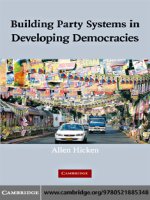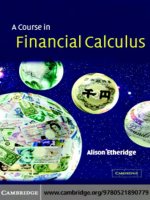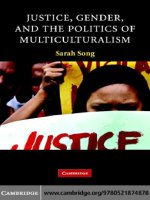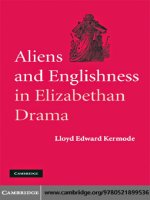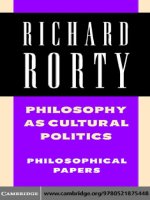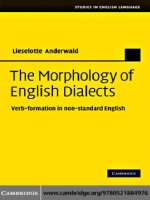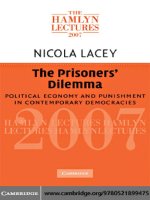cambridge university press aliens and englishness in elizabethan drama mar 2009 kho tài liệu bách khoa
Bạn đang xem bản rút gọn của tài liệu. Xem và tải ngay bản đầy đủ của tài liệu tại đây (1.28 MB, 216 trang )
This page intentionally left blank
ALIENS AND ENGLISHNESS
IN ELIZABETHAN DRAMA
Covering a wide variety of dramatic texts and performances from
1550 to 1600, including Shakespeare’s second tetralogy, this book
explores moral, historical, and comic plays as contributions to
Elizabethan debates on Anglo-foreign relations in England. The
economic, social, religious, and political issues that arose from interBritish contact and Continental immigration into England are
reinvented and rehearsed on the public stage. Kermode uncovers two
broad ‘alien stages’ in the drama: distinctive but overlapping
processes by which the alien was used to posit ideas and ideals of
Englishness. Many studies of English national identity pit
Englishness against the alien ‘other’ so that the native self and the
alien settle into antithetical positions. In contrast, Aliens and
Englishness reads a body of plays that represents Englishness as a state
of ideological, invented superiority – paradoxically stable in its
constant changeability, and brought into being by incorporating and
eventually even celebrating, rather than rejecting, the alien.
ll oy d e dw ar d k erm od e is Associate Professor in the
Department of English, California State University, Long Beach.
He is the editor of Three Renaissance Usury Plays, and co-editor, with
Jason Scott-Warren and Martine van Elk, of Tudor Drama before
Shakespeare, 1485–1590: New Directions for Research, Criticism, and
Pedagogy.
ALIENS AND ENGLISHNESS
IN ELIZABETHAN DRAMA
LLOYD EDWARD KERMODE
California State University,
Long Beach
CAMBRIDGE UNIVERSITY PRESS
Cambridge, New York, Melbourne, Madrid, Cape Town, Singapore, São Paulo
Cambridge University Press
The Edinburgh Building, Cambridge CB2 8RU, UK
Published in the United States of America by Cambridge University Press, New York
www.cambridge.org
Information on this title: www.cambridge.org/9780521899536
© Lloyd Edward Kermode 2009
This publication is in copyright. Subject to statutory exception and to the
provision of relevant collective licensing agreements, no reproduction of any part
may take place without the written permission of Cambridge University Press.
First published in print format 2009
ISBN-13
978-0-511-51788-4
eBook (NetLibrary)
ISBN-13
978-0-521-89953-6
hardback
Cambridge University Press has no responsibility for the persistence or accuracy
of urls for external or third-party internet websites referred to in this publication,
and does not guarantee that any content on such websites is, or will remain,
accurate or appropriate.
For aliaunts and butterboxes
Contents
Preface
Acknowledgements
page ix
xi
1 Introduction – aliens and the English in London
1
2 Discovering the alien in Elizabethan moral drama
23
3 Accommodating the alien in mid-Elizabethan London plays
59
4 Incorporating the alien in Shakespeare’s second tetralogy
85
5 Being the alien in late-Elizabethan London plays
119
Postscript: Early modern and post-modern alien excursions
Notes
Bibliography
Index
150
155
184
198
vii
Preface
note on the frontispiece
The frontispiece and cover illustration is from Jost Amman’s Gynaeceum,
sive, Theatrum mulierum [The Theatre of Women] (1586). The book is a
collection of prints from fine wood engravings, each image accompanied
by eight lines of Latin text by Franc¸ois Modius (1556–97). The title-page
notes that the book is designed to present ‘The female costumes of all the
principal nations, tribes, and peoples of Europe . . . in commendation of
the female sex, and for the especial gratification of such as by their
manner of ordinary life, or from other causes, are hindered from distant
travel, but at the same time take pleasure at home in the costume of
various people, which is a silent index of their character.’1 Costumed
appearance of figures is of primary importance throughout this study as
various dramatic ‘types’ and disguises question early modern notions of
social, political, gendered, and religious ‘character’. Amman’s ‘married
lady of London’ is what Pisaro’s daughters are aspiring to in their attempt
to shed their Portuguese nationality in William Haughton’s Englishmen
for My Money. This matron also, according to the dedicatory letter by the
printer Sigmund Feyerabend of Frankfurt (1528–90), represents a moral
goodness that we see being strived for in Robert Wilson’s The Three
Ladies of London. The text accompanying the image tells us that Amman’s
London matron has rosy cheeks deserving of a wealthy husband. She is
thus a poignantly optimistic version of Three Ladies’ Lady Conscience,
who is by contrast offered the stability of marriage only by the laughable
Simplicity and whose ‘reddy and white’ ‘cheeks’ attract the wealth of
corrupted Lady Lucre. Amman’s presentation of women, and
Feyerabend’s covert instruction of women, as on one hand a locus of
national glory and praise and on the other hand the obvious site for
corruption and failure to maintain moral uprightness, are further
touchstones for the interplay of gender, national security, cross-border
ix
x
Preface
traffic of bodies and habits, wealth, and religious conscience in the
comedies and histories discussed in Aliens and Englishness in Elizabethan
Drama.
note on quotations
Quotations from early modern texts have retained original spelling with
the exceptions of silent i/j and u/v correction and modern title
capitalization.
Quotations from Shakespeare are taken from The Norton Shakespeare,
2nd edition (2008).
Acknowledgements
This book has taken a long time to write. And rewrite. And rewrite again.
Meredith Skura and Edward Snow gave me helpful guidance throughout
its initial phase. The book was rewritten during a Barbara Thom
Fellowship at the Huntington Library; it was rewritten again a few years
later in response to the bulk of new published material on British studies
and ‘London plays’; and it was substantially revised over the past couple
of years thanks to the incisive and extensive readings of several
anonymous readers. My gratitude is due to Sarah Stanton, Rebecca
Jones, and everyone else involved in producing this book at Cambridge
University Press. To Martine I owe almost everything else.
Rewritten sections of two previously published essays appear in
Chapters 3 and 5: ‘The Playwright’s Prophecy: Robert Wilson’s The Three
Ladies of London and the “Alienation” of the English’, Medieval and
Renaissance Drama in England 11 (1999): 60–87; and ‘After Shylock: the
“Judaiser” in England’, Renaissance and Reformation 20 (1996): 5–25.
The frontispiece is reproduced by permission of the Huntington
Library, San Marino, California.
xi
chapter 1
Introduction – aliens and the English
in London
aliens, foreigners, citizens
Tens of thousands of Continental migrants passed in and out of London
and other major English towns during the reign of Elizabeth (1558–1603).
The merchants of London were used to seeing aliens in their midst,
Germans and Italians in particular being a significant presence since the
twelfth century. But wars and military occupation in sixteenth-century
northern Europe changed the complexion of the immigrant body in
England. Protestants migrated in waves after the 1567 news of Alva’s
troop deployment to the Netherlands and after the fall of Antwerp in
1585, and a number of French Protestants made their way to England after
the Paris Massacre of 1572.1 Edward VI had established French and Dutch
churches in London in 1550, when the resident alien population of
England was at its peak, and these institutions continued to act as religious, social, and organizational community centres for the immigrant
population throughout the century.2 Among the religious refugees,
however, were economic migrants, and this mixed group caused significant tension in the capital. On the one hand, the new residents brought
new skills and stature to English production and trade. On the other
hand, they were seen to be economically and ideologically dangerous:
they clustered and traded among themselves, sent money abroad instead
of reinvesting it in England, and practised religion that was influenced
by extremists and attracted good members away from the Church of
England.
Resentment against the aliens caused friction between English classes.
Landlords benefited from the new immigrants as renters of cheap
accommodation, while apprentices and journeymen saw aliens as stealers
of jobs from the English. Reformed Christian immigrants were transnational ‘brothers’ against the Catholic beast, but the problem of extreme
Protestantism from the Continent continued to trouble the queen.
1
2
Aliens and Englishness in Elizabethan Drama
Moreover, the question of rights to work in the city of London was a
constant point of debate between the mayor, the guilds, and the Privy
Council.3 All these groups were similarly concerned about the size and
impact of the alien population, and the Crown maintained a policy of
dispersal, planting immigrants in provincial towns to spread both the
wealth and the worry of the new communities. With perhaps 50,000
Continental aliens coming into England during Elizabeth’s reign and
living in clustered – and therefore visible – communities, it was not
surprising if a perception of an ‘alien invasion’ was in the air.4 But placed
in the context of the general rise of English and ‘British’ residents in
London, the contemporary censuses (the Returns of Strangers) show a
proportional decrease in the Continental alien presence in the latter half of
the century: from 12.5 per cent in 1553, to 10 per cent in 1571, falling to
between 5 and 6 per cent in 1593.5 Indeed, Elizabethan London’s population was growing at an extraordinary rate, a phenomenon underpinned
by migration from within the ‘British Isles’. In the year 1600, London was
over sixteen times larger than Norwich, the next most populous English
town; fifty years later, it would be second only to Paris in European city
population.6 Frustrations about overcrowding and economic strain led to
urban unrest, and the strangers ‘provided a convenient scapegoat’ for
expressing that frustration in sometimes violent ways.7
While the usage is not perfectly consistent, Elizabethan documents
widely employed the terms ‘alien’ and ‘stranger’ to refer to persons from a
foreign country. The home ‘country’ in the second half of the sixteenth
century is England plus the Principality of Wales. The Scots and the Irish
are, therefore, ‘aliens’ along with the Continental European strangers. The
term ‘foreigner’ referred to persons from outside the city or region being
discussed or those who were not ‘freemen’ of the city (belonging to a guild,
allowed to keep an open retail shop, possessing voting and civic representation rights). Continental aliens were usually ‘foreigners’ too, then, in
so far as they rarely gained the freedom of the city and became ‘citizens’.8
In practice, freemen Londoners might cast themselves specifically within
what the character Pleasure in Robert Wilson’s The Three Lords and Three
Ladies of London calls a ‘race’ of London.9 That would set them against
the provinces, such that while ‘“Foreign” English, needless to say, had
separate interests from continental strangers’, they were ‘often lumped
together with them by citizens’ of London as general outsiders.10 On the
occasions I use ‘foreigner’ in this book, I generally do so in the modern
sense of the term, synonymously with ‘alien’ and ‘stranger’; I make it clear
when I am talking specifically of the early modern sense of a foreigner.
Introduction – aliens and the English in London
3
In between the status of a ‘true born’ English man or woman and an
alien was a denizen, a permanent resident with rights of residency and
work in the adopted country. Denizens achieved their status through
letters petitioned from the Crown. The exact privileges of any denizen
were individually laid out in the letter, and it was a status that began with
the date of the letter and was not inherited by the children of the alien.11
In a state of limbo throughout the period were those whom we might
consider English subjects (i.e. born to English parents) but born abroad
(again, including in Scotland and Ireland) or born in England to one or
two alien parents. Parliamentary debate and court cases through the reign
of James I argued the national status of such persons, and the drama
provides several examples of equivocally identified alien residents.12 Aliens
could also petition and pay for an Act of Parliament for naturalization,
but very few took this expensive route. In fact, a surprisingly small number
of aliens seem to have taken the option of the relatively inexpensive
denizenship. Even before one of the primary benefits of denizenship –
the right to apprentice an alien son with an English master – was
removed by an Act of Common Council in 1574, the proportion of
aliens taking denization was fairly low. There was also a very significant
drop-off in letters of denization issued later in Elizabeth’s reign: from
1,669 in the period 1558–78 to 293 in 1578–1603. Only 1 per cent of the
alien population in 1593 had free denizen status.13 This may indicate a
loosening of the official attitude towards alien and native commercial
contact as the alien communities became assimilated, such that aliens no
longer needed letters to practise their trades with English men. It may
also indicate the opposite: aliens could have become more introspective
and dealt more within their own communities. There may also have
been a decreasing commitment to permanent settlement, for aliens who
could not be sure they would remain in England for long probably did
not feel a strong need for denization.
alien stages and alien confusion
This book studies the ways in which English drama in the second half of
the sixteenth century responded to and represented the increasingly
diverse and increasingly fraught contact between alien and English men
and women in London and England. From this context, I theorize the
ways in which certain plays create a notion of ‘Englishness’ that early
modern London audiences might – for better or for worse – recognize
and approve of. In the preceding section, I outlined early modern
4
Aliens and Englishness in Elizabethan Drama
categorizations of national and local identity. Below, I introduce my
own terminology for the present study, and as I do so I remain aware
that retrospective labelling of a period or culture can make or impose
categories as well as describe them. Therefore, I base my readings of
Elizabethan drama in the contexts, signs, and events of the period. At the
same time, I am interested in testing the effectiveness of stepping back
into our own time to use hindsight and modern theoretical and political
tools to assess the desires and anxieties and hopes, the proofs and arguments and gaps in Elizabethan English understandings of regional,
national, and international relations.
This section’s title phrase, ‘alien stages’, indicates this book’s concern
with several aspects of the working of the Elizabethan stage. First, rather
simply, I am studying plays in which physical representations of contemporary and recognizable aliens appear on the stage. Second, where the
English stage shows a play set primarily in England but featuring alien
characters, it becomes an alien stage as representations of non-Englishness
essentially determine dramatic ‘readings’ of London, England, ‘British’
history, and communal identities. And third, there were two broad steps
or stages in the dramatic representation of the alien in Elizabethan
England.
In the first ‘alien stage’ (primarily but not exclusively in the Marian
and earlier Elizabethan drama), English–alien contact is represented as
causing infection, ‘deformation’, or corruption by the presence of real
alien bodies and influences. These earlier plays appear to do what they
can to dismiss or eliminate alien elements (characters, habits, professions,
clothing, language). They set up Englishness against otherness by homogenizing the varieties of alien identity (thus all foreigners are equally
‘other’; thus all ‘others’ are diseased, corrupt, etc.). To highlight distasteful foreign elements and make of them a common denominator
against which to define Englishness is the process of national-identitybuilding outlined by much current criticism, and I discuss this trend
below.
The second ‘alien stage’ is suggested and tested in late morality plays,
but is only clearly manifested in the late-Elizabethan drama. In this latter
stage, the plays demonstrate that the absorption of what was deemed
utterly ‘alien’ in earlier drama is not just acceptable, but also necessary,
for the rise and maintenance of what the plays set forth as a stable, strong
English protagonist. ‘Englishness’ in the plays always requires some moral
grounding that asserts its superiority to other cultures (and in Elizabethan
plays specifically un-Reformed cultures), and it requires physical prowess
Introduction – aliens and the English in London
5
demonstrated by strength of mind (standing one’s ground in the face of
adversity) and strength of body (successful judgement against evil,
usurpation of positions of power, comic trickery) to secure solutions to
intractable problems. ‘Englishness’ in these later cases combines itself
with the alien and (generally rhetorically) extracts out of that fusion a
reformed, expanded, revitalized, and always politically equivocal definition of the English self. As we will see throughout the book, the very
status of ‘Englishness’ as a phenomenon with an existence prior to alien
contact is continually undermined.
The working of the second alien stage is hardly straightforward, as it
argues for an Englishness that is not set against the alien but rather relies
on the presence of that other within itself. I contend that this notion of an
Englishness that incorporates the alien in all aspects of its representation
would not have been too surprising to Elizabethan writers or thinkers.
In his Italian–English primer, First Fruits (1578), John Florio has his
Englishman ask an Italian what he thinks of the English language. The
Italian replies:
Certis if you wyl beleeve me, it doth not like me at al, because it is a language
confused, bepeesed with many tongues: it taketh many words of the latine, & mo
from the French, & mo from the Italian, & many mo from the Duitch, some
also from the Greeke, & from the Britaine, so that if every language had his owne
wordes againe, there woulde but a fewe remaine for English men, and yet every
day they adde.
[. . .]
Make the experience of it, take a booke and reade, but marke well, and you
shall not reade four woordes together of true English.14
This sense of the English language as a hodge-podge of tongues was
asserted by several writers in the period. Language becomes a vital concern in most of the plays that I discuss in this book, because use and
avoidance of language is seen to reveal the will of characters to be
incorporated into various communal bodies. I have introduced the
‘mongrel’ English language issue here as a symptomatic synecdoche for
the state of Englishness as a whole. For what is interesting in this passage
is the use of the word ‘confused’ to describe English a few lines before the
concluding notion that there is such a thing as ‘true English’. We are thus
presented with the two basic nuances of the word confuse: a sense of
uncertainty and disorientation on the one hand, and the process of
‘con-fusing’ or coming-together to form a single entity on the other. The
end of the passage attempts to keep an alien–English division to stave off
6
Aliens and Englishness in Elizabethan Drama
the fear of confused uncertainty in a mixed-up language. Yet such
exclusivity of identity is already made equivocal by the passage’s
acknowledgement that ‘confusion’ in the second, literal sense lies behind
the very construction of Englishness.
The passage from Florio briefly lays out the perspective of the two alien
stages by keeping them both in suspension: as in the first alien stage, the
speaker attempts to retain an oppositional hypothesis that the alien
somehow comes along after the creation of an entire language of ‘pure
English’ and invades it; however, as acknowledged in the second alien
stage, the speaker has already outlined a process in which English is
‘bepeesed’, put together with foreign tongues – the alien is within English
as it is being formed. The Italian speaker also notes that English ‘is a
language that wyl do you good in England, but passe Dover, it is woorth
nothing’,15 suggesting the confusing paradox of a language made up of all
the tongues from past Dover, but which is useless once outside the
confines of the English borders. Englishness is an identity that only exists
by containing the alien, yet it is an identity separate from other national
identities.
In the second alien stage, and in the drama of the last decade of
Elizabeth’s reign, the search for a settled and ameliorating sense of
Englishness will no longer permit simplistic tar-brushing of the alien;
each alien element must instead be recognized as already involved in –
confused with – English society or culture. As with the language that only
develops into a full system by absorbing (pre-existing) alien words, the
plays show the alien being absorbed and fused with the native self as that
native forms and claims an ‘Englishness’. The fact that such Englishness is
most fully laid out by morality vices (with, as we shall see, alien origins), a
Welsh king of England, and daughters of a Portuguese father in Englishmen for My Money lets us know that the question of origins remains at
stake through the Elizabethan period, and remains unanswered. At any
point a culture can look back and talk about previous incarnations of
native identity, but from any point that identity can be seen as constructed from alien incorporation. This book will not resolve the question
of the English chicken and the alien egg.
The second alien stage, then, gives us something beyond the traditional
view of identity determined by its difference from the other: Englishness
as an ideology of power built, paradoxically, around the alien that is
within it, ‘con-fused’. The process of alien incorporation between the first
and the second alien stages is a political and rhetorical move as much as it
is a representation of cosmopolitan awareness on the part of English
Introduction – aliens and the English in London
7
writers and audiences, because any ‘openness’ to the other is necessarily
also a co-option of the other. To deny the alien through a prejudicial
or ignorant confusion and rejection, as in the first stage, is to leave
Englishness always naive and open to surprise, attack, and deformation by
alien bodies and ideas. To incorporate the alien within Englishness by
productive confusion, as in the second stage, is to hybridize and
strengthen Englishness for its long-term imperial presence in wider
British, European, and worldwide contexts.
The drama’s rhetorical constructions of and rehearsals of versions of
‘English identity’ embed belief in the concept’s reality. If the steady intake
of alien elements – foreign bodies – promotes representations of an
Englishness vaccinated against ‘impurity’ from the outside, it should be
made clear early on that such an idea of exclusive identity is a fiction. The
alien remains as a slightly uncomfortable joke or as ancestry to be suppressed and recast. Here, that other rather Miltonic sense of ‘confuse’
as the confounding (confundere) of the rebel angels comes into play,
whereby determination to be oneself, to be true to one’s not-lost identity,
in spite of adversity, is itself delusional – but powerfully so. Ideologies of
identity do not lose their status as having material existence within
societies just because their truth factor is compromised. Thus the plays
can produce identity separately from politico-historical impositions of
geographical and religious identity. I should close this section with the
note that the plays engage with the two alien stages as a matter of degree
rather than exclusively – one play’s anxiety and rejection of the alien may
overshadow a subtle awareness of the alien’s potential usefulness; another
play may be very interested in celebrating the alien in England and
Englishness while retaining some basic prejudices against the ‘other’.
‘the stage is england’: critical and dramatic
positions on national identity
Much of the critical examination of representations of English identity
has remained a study of the first alien stage. We have consistently been
told in cultural and literary studies of English national identity that selfidentity is determined by its reaction to the other, and specifically its
insistence on its difference from the other. The attraction of an antagonistic, oppositional theory of national identity formation has produced
many exciting studies of exotic English–alien contact in plays set abroad,
which engage forcefully with the early modern matrix of religion,
ethnicity, sexuality, and commerce. Since these plays are usually travel or
8
Aliens and Englishness in Elizabethan Drama
historical plays featuring merchants, pirates, renegades, and soldiers, the
premise of Anglo-alien opposition is reasonable. But in British studies,
too, we are told that ‘nationality can only be imagined as a dimension of
difference’ from the outside world; ‘England is always discovered elsewhere, defined by the encounter with the Other’ (frequently for these
critics, the Irish ‘other’); ‘Englishness and English nationality have been
historically defined against non-Englishness’; ‘“Englishness” at this point
in time is fiercely determined by a demonisation of all that is not English’;
and ‘not-Welshness, not-Scottishness, and certainly not-Frenchness [and]
not-Spanishness . . . gave the English their surest sense of national
identity’.16 One problem with these statements is that they seem to claim
to know what Englishness is. I have been frequently using ‘scare quotes’
for the term Englishness so far to indicate the fact that ‘Englishness’ is not
a stable concept, but one that is worked out and defined time and again in
different plays and decades. Another problem is that the statements seem
to place ‘Englishness’ only within a ‘nation’ of England that feels a sense
of ‘national identity’, and they seem to assert that there is no ‘Englishness’
outside of England.
In his examinations of English nationhood, Richard Helgerson takes
the investigation of the English search for a stable identity in a different
direction. He has provided an alternative way to think of the production
of a ‘colonial’ English self, one that brings the view closer to home in
geographical terms but pushes it further away in time. He emphasizes the
irony of Elizabethan writers’ obligation to and desire for another set of
others – the ancient colonizing Romans. The late sixteenth-century call
for English rediscovery of their poetic genius did not strive for a new and
different mode of expression but for a reliance on foreign examples, he
argues: ‘Likeness, not difference, will be the measure of success.’17 Thus
the alien invaders and their cultural legacy are indeed acknowledged as
incorporated into Englishness, but this ‘likeness’ produces a new identity
that is specifically ‘English’ (those Romans are gone) and therefore still set
in opposition to contemporary alien bodies and cultures – this doubleness
echoes John Florio’s Italian speaker’s representation of the English language.18 Other scholars, such as Jodi Mikalachki, have also concentrated
on the need for the English to understand themselves through classical
comparison. She writes of the English ‘longing on the one hand to
establish historical precedent and continuity, and an equally powerful
drive on the other to exorcise primitive savagery from national history
and identity. The tensions between theses two imperatives inform virtually all articulations of the nation in this period.’19 This book agrees
Introduction – aliens and the English in London
9
that the English are striving for stability as they search for national
identity’s ‘precedent and continuity’, but it updates the notion in so far as
the ‘savagery’ of the modern men and women in the plays set in contemporary England only bears a trace of the ‘primitive’. The alien tendencies are just as often newfangled abhorrences as they are ancient
monstrosities (although bad alien habits – for example taking tobacco –
often have earlier ‘primitive’ lives).
Two broad points of view dominate studies of English national
identity, then: one in which English identity is formed by a centrifugal,
colonial activity that uses the other in foreign lands against which to
define itself; the second in which the centripetal colonial activity of the
distant past haunts and to some extent constrains a creation of English
national identity. In contrast to these positions, Aliens and Englishness is
concerned with an important body of sixteenth-century drama that works
out Englishness by dealing not with exotic or ancient others but with
European aliens of the present and relatively recent past; not by resistance
and antithesis alone but by absorption and similitude; not with
‘elsewhere’ as a location of non-Englishness but with the here and often
the now of England (and the expanded ‘England’ of Britain). Aliens and
Englishness sees Elizabethans’ reflections on English identity as increasingly a process of finding and absorbing alien aspects around them and
less the simple phenomenon of frictionally and uncooperatively rubbing
up ‘against non-Englishness’. Therefore, the dramatic selection for study
in this book has been guided by those plays that are set primarily in
England and deal with relatively modern (i.e. not ancient) English, British,
and European characters. The religious questions in Aliens and Englishness
concern the Catholic military and ideological threat, the acceptability of
immigrants’ radically reformed Protestantism, the strength of supranational fellowship with Continental Protestants, and the real or imagined
presence of Jews and ‘Jewishness’. The ethnic and ‘racial’ questions are
those of cultural traditions and ‘difference’ between European and British
neighbours. In the plays this involves aliens who were significantly visible
in London and a few major towns – mostly the Dutch, French and Frenchspeaking Lowlanders (Walloon), Welsh, and also to some extent the
Italians and Iberians. Questions of sexuality carry over from moral drama’s
overt preaching to reprise in the later Elizabethan drama as a set of
reformed Christian imperatives in new, urban, mimetic contexts. Finally,
the economic questions concern urban artisans and merchants and their
ability to live in London and the larger provincial towns, which they felt
were increasingly populated by aliens.
10
Aliens and Englishness in Elizabethan Drama
By studying the ways in which the plays work through perceptions of
the subtle shifts in Anglo-European social and political alignment, we
follow dramatic representations and creations of Englishness that were, I
suggest, more ‘real’, present, and ‘closer to home’ to the Elizabethan
playgoers; more essential to an English understanding of London; and
more finely tuned to that audience’s immediate concerns than the
assertions of self and other, native and alien, ‘barbarous’ and ‘civilized’
that we find in literary representations of exotic Anglo-American, AngloMediterranean, or Anglo-Eastern contact. While ethnic ‘others’ have been
treated very seriously in literary criticism of the past thirty years, the white
male and female alien to Englishness have received more attention from
historians’ studies of migration and labour patterns and less attention
from literary scholars interested in how alien figures are represented and
used in imaginative and ideological ways.
The main study texts in this book are plays set in England, and these
productions force a focus on what the Elizabethan dramatists decided
to represent about the incoming alien, rather than how English selfperception was challenged and changed by external alien encounters. So,
while a large proportion of the English were no doubt fascinated by
images and narratives of and about the New World, Africa, and Asia –
and Henslowe’s diary shows that this was a large part of his theatre’s
repertoire – such texts did not extend to fantasies of an England peopled
by Americans or Africans. (This is of course in spite of such historical
phenomena as the presence of a small but noticeable black community in
late-Elizabethan and Jacobean London, revealed to us through expulsion
orders.)20 Caliban is not in Elizabethan drama, nor is he in England for
an extended period of time – although Trinculo reminds us a decade after
this study leaves off that he could have been. Literary and narrative
representation of these ethnic groups probably helped prompt ideologically self-centred confirmations of national and personal superiority
on the part of the English, but exotic foreigners either remain distant and
among other foreigners, or they are catalysts, enhancing certain interactions between English citizens and British or European others. With
this domestic dynamic in mind, we should take seriously the literal
suggestiveness of the scene-setting in the list of ‘The Actors Names’ in
Grim the Collier of Croydon, possibly by William Haughton, where we
read that ‘The Stage is England ’. Instead of the more benign ‘The scene is
England’, the statement suggests a stage that not only works with
‘Englishness’ in some ways, but is compulsory viewing in order to know
England. This interestingly alters and arguably compounds Thomas
Introduction – aliens and the English in London
11
Platter’s famous remark about English insularity, that ‘the English pass
their time, learning at the play what is happening abroad’: they apparently also pass their time learning at the play what is happening at home
and how they might want to think about themselves.21 The concept of the
stage as England – as alleged island (in place of Britain), as powerful space
surrounded on all sides, as a place with both a fixed identity and a
mutability like the English character itself – bears further examination
throughout this study. This may be especially true in relation to
the history plays, which must make the theatre England, and the London
comedies, which take place in a theatre that is already part of the
London topography with which they are so overtly concerned.
Aliens and Englishness’ concentration on plays set in England, moreover, demonstrates that any country, before it can go out and ‘overwrite’
another country, creates methods and practices through which it is itself
overwritten, self-edited, and reproduced both internally and on its margins. This is an ongoing, contemporary phenomenon, not just something
from an ancient colonial past. The flourishing of drama in a country that
came late to the colonial race happened not in general response to an
outgoing English who were inventing or re-inscribing the alien, but in
response to the incoming aliens (as visitors and residents). Scholarly
concentration on Jacobean drama and aliens has placed the interest in
foreignness abroad or in a well-developed cosmopolitan London. But
Aliens and Englishness reveals the idea of the alien being worked out long
before this, in an environment of smaller spheres of experience, where
only hints of the exotic would have made their way to the majority of
theatre audience members. In this sense, the present study is pre-colonial,
for it shows how dramatists attempted to work with a conflicted country
before the permanence of the Jamestown settlement: a country at war
with Continental and domestic religious opponents and dealing with
domestic unrest over class, economic and social decline, and immigration
(especially into London and Norwich). But it is also a study of imperial
England. For the distant history of Roman occupation, the wars and
settlement in Ireland, the rhetoric of empire that confuses expansion
within the ‘British Isles’ and expansion beyond the Atlantic archipelago,
the conflicts over trading routes and the establishment of trading companies in the last three decades of the sixteenth century, the increasing
importance of Elizabethan piracy and renegado activity, the reports of
foreign conquests in the New World, and the endeavours of English
captains were all factors promoting a patriotic and ‘nationalist’ surge
among court advisers, the literati, and the merchant classes, who felt
